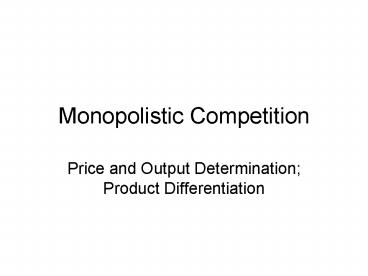Monopolistic Competition - PowerPoint PPT Presentation
1 / 11
Title:
Monopolistic Competition
Description:
Price and Output Determination; Product Differentiation. Assumptions ... Firms do not operate at lowest point on ATC. Excess capacity ... – PowerPoint PPT presentation
Number of Views:36
Avg rating:3.0/5.0
Title: Monopolistic Competition
1
Monopolistic Competition
- Price and Output Determination Product
Differentiation
2
Assumptions
- Large number of buyers and sellers
- No barriers to entry
- Product differentiation
- Perfect Information/no uncertainty
- U-Shaped cost curves
3
Price and Output - Short Run
- Each firm is a price setter.
- Price and output chosen so as to maximize
profits MRMC
4
Price and Output - Long Run
- Positive profits will attract entry by close
substitutes - As entry occurs, demand for brand x will decrease
and become more elastic - In long run equilibrium, zero economic profits
5
Economic Efficiency
- MBgtMC
- Firms do not operate at lowest point on ATC
- Excess capacity
- Trade-off between variety and efficiency
6
Product Variety Under Monopolistic Competition
- Hotellings Model of Ice Cream Vendors at the
beach
7
Hotellings Model
- Sunbathers are distributed evenly along the beach
- Vendors arrive sequentially, but can move their
carts - Price is fixed
- Sunbathers buy from closest vendor
8
Equilibrium with Two Vendors
A
A
B
Firms will locate on either side of the midpoint.
9
Equilibrium with Three Vendors
A
C
B
Firm A has no market share so would try to
relocate to the other side of either C or B, but
then that vendor would want to move. No
equilibrium.
10
Equilibrium with Four Vendors
0.75
0.25
With four vendors, they group together at the 1/4
mile marker and the 3/4 mile marker.
11
Too Much Sameness?
- Hotelling argued that competition tends to
produce too much sameness. Applications to
sweetness of cider and positions of political
parties - With monopoly, there is a tendency to produce the
least common denominator product.































